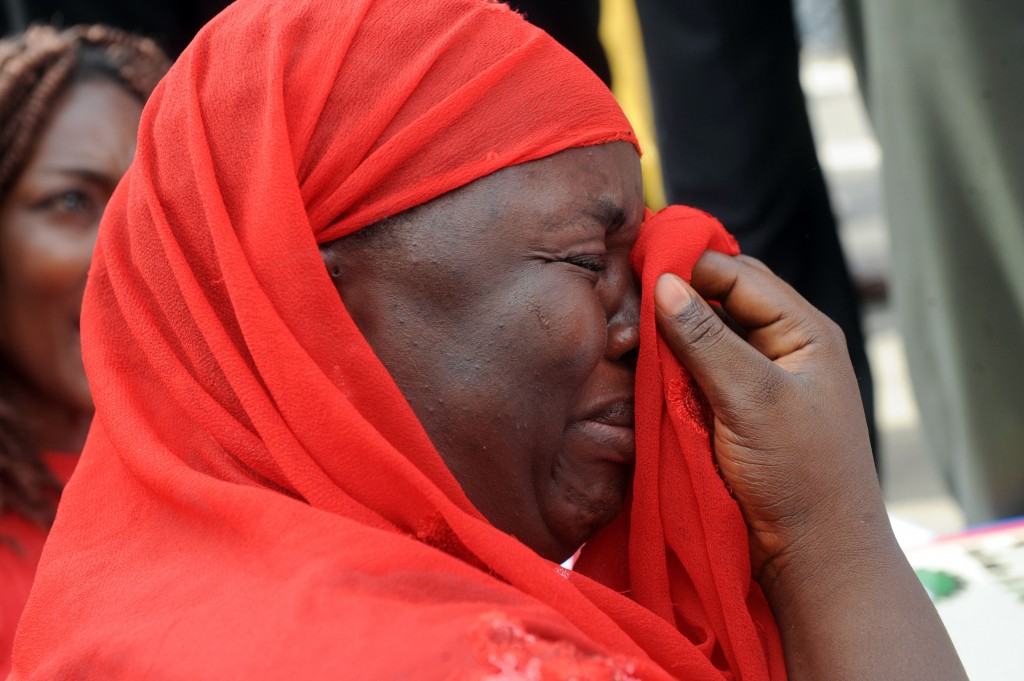
One of the mothers of the missing Chibok school girls wipes her tears as she cries during a rally by civil society groups pressing for the release of the girls in Abuja. (Photo: PIUS UTOMI EKPEI/AFP/Getty Images/Newscom)
Heritage’s Africa Expert, Charlotte Florance, sat down with us to explain the situation in Northern Nigeria and the tragic abduction of more than 250 high school girls by the terrorist group, Boko Haram. More than 200 of the girls remain missing and another eight girls were abducted Tuesday evening. The girls likely will be sold into slavery if they have not already. The abductions and the recent bomb blasts in Nigeria’s capital signal serious political, security and economic challenges for the entire region.
What is Boko Haram?
Boko Haram is a Nigerian-based insurgent terrorist organization that has received funding and training from al-Qaeda in the Islamic Maghreb, al-Qaeda’s North Africa franchise. Boko Haram is based in Northern Nigeria and seeks to impose a Sharia state on Nigeria. Boko Haram has effectively turned the northern part of the country into a conflict zone, forcing more than a quarter-million Nigerians to flee their homes.
The terrorist group conducts nearly daily indiscriminate attacks against both Muslims and Christians, including car bombs, assassinations, shootings, raids and abductions. More than 8,000 people have died in the past four years as a result of Boko Haram and Ansaru’s (a Boko Haram breakaway organization) violent activities.
Boko Haram and Ansaru were designated as official U.S. terrorist organizations by the State Department last fall. This allows the U.S. government to track and freeze the organization’s financial resources and makes U.S. citizenry support of the organizations illegal.
Does Boko Haram operate outside of Nigeria?
Yes, spillover violence from the group has spread to Niger, Chad and Cameroon. Boko Haram is a serious concern for the entire region’s stability. Cameroon has been particularly affected by Boko Haram. Because of the lack of both Nigerian and Cameroonian government presence in the border regions, Boko Haram has been able to operate freely in the heavily forested area on both sides of the Cameroon-Nigeria border – including robbing and kidnapping Cameroonians. Boko Haram also has been able to effectively recruit foot soldiers from Niger and has established arms supply lines to dealers in Chad.
Why did Boko Haram abduct the girls and where are they now?
The abduction of the girls from Chibok follows Boko Haram’s desire to ban women’s education and its goal to create a Sharia law state. Since 2013, Boko Haram has claimed it would abduct infidel women and turn them into slaves to sell at the market. Boko Haram is reported to have kidnapped around 25 girls earlier in April and sold them for as little as $12.
The girls’ whereabouts are believed to be somewhere in that dense forest on the Nigeria-Cameroon border. The area is a de-facto Boko Haram-controlled part of the country given the Nigerian army’s inability to operate effectively in the region. In a video released yesterday by the leader of Boko Haram, Abubakar Shekau, Shekau pronounced, “Girls, you should go and get married” and repeatedly called for Western education in Nigeria to end.
What is the government of Nigeria doing to counter Boko Haram and safely secure the remaining abducted girls?
The Nigerian government and President Goodluck Jonathan have failed to recognize the conflict with Boko Haram as more than a “temporary” crisis. The conflict has been increasing for years, and, given the escalation in terrorist tactics, violent attacks on the capital city and operational zones, a state of emergency and heavy-handed military campaigns are not sufficient to eliminate the Boko Haram threat.
A regional response will be required not only to secure the girls – if, in fact, they have been transported to Cameroon and likely sold across the region – but to effectively counter Boko Haram and Ansaru. Failure by Nigeria and its partners to stop Boko Haram could be extremely detrimental to long-term growth and stability in Africa.
The Obama administration has announced it was sending a limited number of military personnel, intelligence and negotiators to assist the Nigerian government in locating and securing the girls. Given the regional ramifications of Boko Haram and the likelihood of the girls being outside of Nigeria, the U.S. personnel likely will have a limited impact on securing the girls other than to allow President Obama to say he “did something.”


























